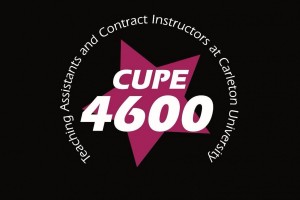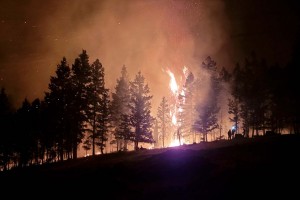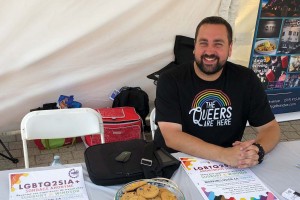Ahead of its time and aware of its times, the Toronto & York Region Labour Council celebrates its 150th anniversary this year. Under the new leadership of Andria Babbington, the labour council’s first Black woman president, the next 150 years are off to a historic start.
Our Times asked a few labour council activists about their involvement in the labour movement, their views on the future of work and workers’ rights, and which moments in labour history, particularly the labour council’s history, they find especially meaningful.
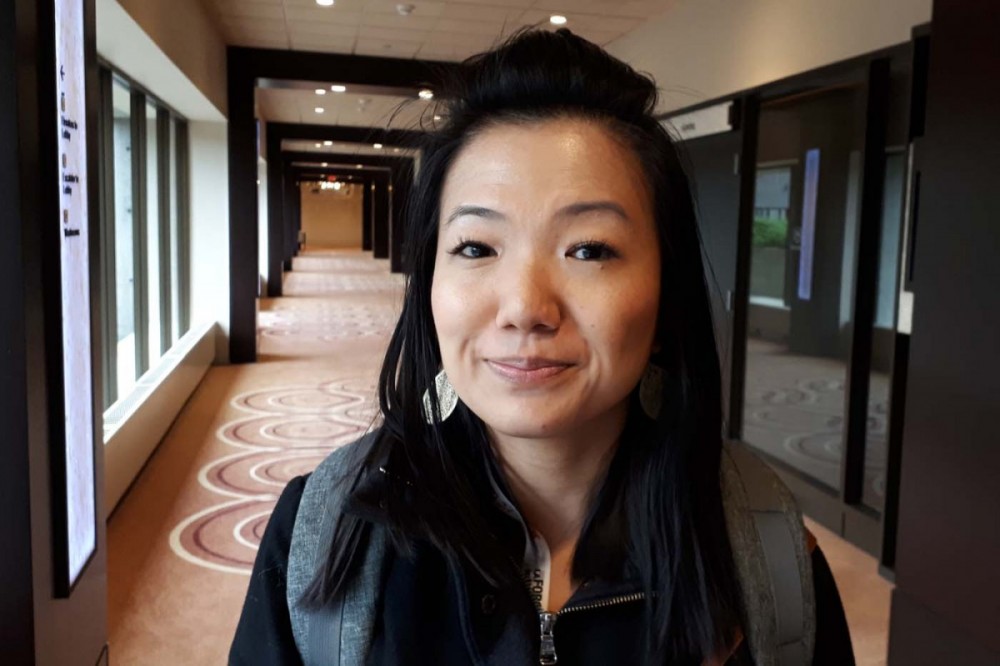
“The best part of my work is working with other people who also believe in the vision of a more racially just, socially just society,” says Jennifer Huang. PHOTOGRAPH: LORRAINE ENDICOTT
Jennifer Huang
Jennifer Huang is an executive assistant at the Toronto & York Region Labour Council. A member of the Asian Canadian Labour Alliance (ACLA), she helped establish the labour council’s Chinese Workers’ Network in 2012. It has since become a template for others like the Tamil Workers’ Network, the Filipino Workers’ Network and the Somali Workers’ Network.
ON THE PRESENCE OF THE PAST: Huang says she considers it meaningful to recognize parallels between the past and the present: “I think that the xenophobic racism used to keep Chinese out (with the Exclusion Act), keep the passengers from the Komagatu Maru from setting foot in Canada, and detain Japanese Canadians in WWII, is the same racism that we see happening today.
“We just skirt the issue of race and pass the problem to the Americans, and call it different things. But the problem isn’t immigrants or lack of skills or language fluency, it is race. This country was built on racism and it benefited white folks at the top and disadvantaged Black, Indigenous and other folks at the bottom. When a society is baked with such inequities, it will not be fixed immediately. It takes intentionality and time to correct the system.”
ON HOW SHE GOT INVOLVED: “Funny enough, I never knew about the labour movement from school or from my studies,” she says. “I never imagined that there were career paths or jobs within unions, as I imagine most people outside of labour also don’t know. I always thought of civil society and the social justice movement carrying the brunt of the work of promulgating social change.”
When Huang was later teaching adult literacy programs, she kept encountering the truth that would catalyze her activism: “Helping my students in my classroom was only one small way of helping out one family at a time. There were systemic issues that were facing these families and their barriers to employment.
"If I wanted to help out more folks, instead of one student and their family at a time, then I would have to start thinking about organizing workers. I was also really adamant about trying different ways to organize the different Chinese ethnic enclaves in Toronto that I grew up in.”
ON THE BEST (AND WORST) PART OF WORK: “The best part of my work is working with other people who also believe in the vision of a more racially just, socially just society,” Huang notes. “I have deep respect and love for my sisters, brothers and friends who keep fighting and doing this work. The worst part is waking up some days not knowing whether our efforts, or our continued attempts at this, will actually make any dent. I cross my fingers and keep trudging on.”
Even when progress seems out of immediate reach, her Christian faith provides her with hope and belief in a better tomorrow: “I know that there are many others who are like me, praying that we can bring a bit of that heaven closer to earth, praying for that kind of social change and justice to exist on earth, just like it does in heaven.”
ON HISTORIC LABOUR MOMENTS: Now a mother of two with less time for activism, Huang remains dedicated to the labour movement’s goals, with an added layer of perspective. Looking at some of labour’s accomplishments of the past 150 years, she indicates some that are especially meaningful to her: “the abolition of child labour for the poor working classes — I can’t imagine the horror of having to watch my children go to work and be put into dangerous working conditions; the inclusion of women in the union and later, racialized workers, like the Black [train] porters, into the labour movement; and the strike led by CUPW (Canadian Union of Postal Workers) in 1982 for paid maternity leave. Those things I think still impact my lived reality today, and the privileges I get to enjoy.”
ON THE FUTURE: “Coming out of COVID-19, different levels of government will be implementing more austerity measures because they will claim that their coffers are empty. I think we’re going to see austerity measures for all types of public-sector workers, and with that battle cry, private-sector workers will also see their pensions, benefits and wages slashed.
"Even this fight here in Ontario to increase the number of paid sick days during this pandemic has revealed those right-wing ideologues out there who are staunchly refusing, saying that this will bankrupt businesses and major employers. It will be a fight to maintain the status quo on workers’ rights, but we have to figure out how we not only protect what we have, but advance and include the entire working class, not just unionized workers.”
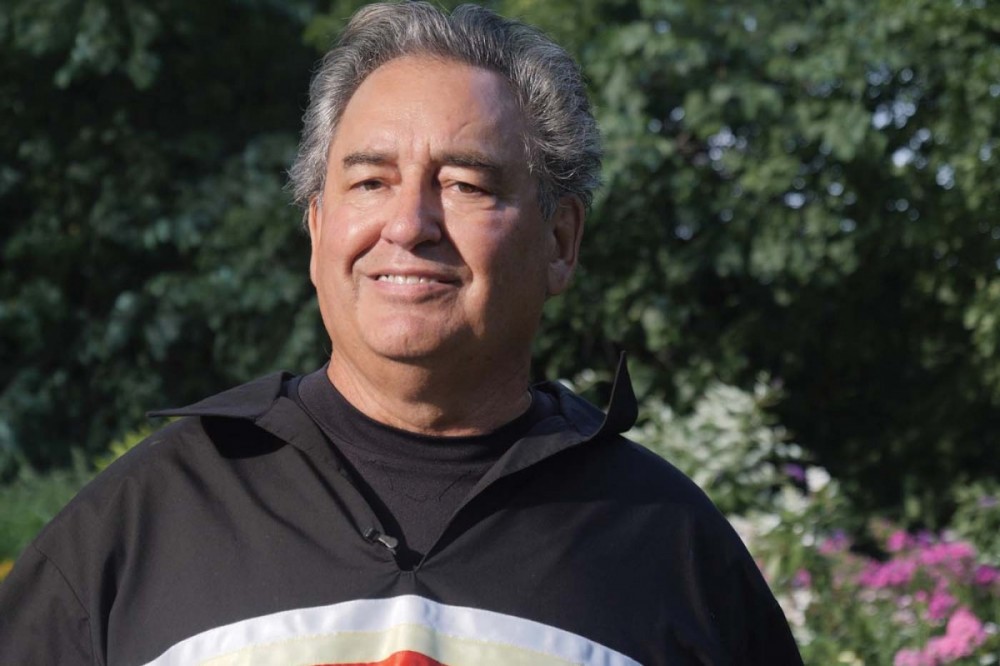
“We need to have a community benefit plan in place so that local people and Indigenous people benefit from the resources in their territories,” says Merv King. PHOTOGRAPH: NADINE MACKINNON
Merv King
Merv King is an Algonquin activist and a member of Timiskaming First Nation. He is coordinator of the Injured Workers Program for the United Steelworkers’ Toronto Area Council and a USW National Aboriginal Committee representative. He is also a member of the Steelworkers’ District 6 Human Rights Committee, and an injured worker (“a long time ago”).
ON HOW HE GOT INVOLVED: “I worked at Canadian Heat Treaters and I became a union steward. Actually, the very first time I ever became involved was when I worked at a steel company. It was called Strand Steel Building Systems and they were building the buildings for the Quebec hydroelectric project. I once wore a T-shirt that said, ‘Save the people, stop James Bay,’ and when I wore that shirt to work, my plant manager said I needed to take the shirt off or go home. So, I chose to go home.
"Then I became the vice-president of the local. Then I became the chief steward. Then I was health-and-safety representative. I used to do all the Workers’ Compensation [paperwork] for the people that I worked with. If they got hurt, I helped them with their claims.”
ON THE BEST PART OF WORK: “I started the Indigenous scholarship in our union,” King tells Our Times. His goal is to build a better future for Indigenous youth, First Nations communities and the union through promoting “greater understanding of unions by Aboriginal youth, and for the union to support and trust, contributing to the Truth and Reconciliation Committee findings.”
King wanted to help young people see unions as more than abstract entities based far away from their communities. “I thought that it would broaden the outcomes by providing students with funding to allow them to invest in higher-education experience, which could include the purchase of items such as tools for trades, technology for use in the classroom, or could be used to pay for living expenses other than the essential items.”
The outcome is a win-win situation: “To allow Aboriginal youth to learn the value of unions” and to garner “stronger support for students, family and friends of USW and unions in general.
“Some of these kids are going to end up being union members, or they’re going to be people who end up being managers of places or they’re going to end up with good, high-paying jobs, and in theory can go back to their own communities and make improvements, like going on to fight for water rights and all sorts of things like that,” notes King. He describes it as building an awareness “that unions can be agents of change for people.”
ON HISTORIC LABOUR MOMENTS: His favourite parts of labour council history involve “the fight for equality, to end systemic racism, and probably the Bromley Armstrong Awards.” King adds that he appreciates the Toronto & York Region Labour Council’s support for teachers, because his daughter is a teacher who supported striking workers at both York University and high school when she was a student.
ON THE FUTURE: King predicts “a much higher demand for healthcare workers and people like long-term care workers” after the pandemic, with “unions more involved with what’s happening, unions taking on more social justice issues” and greater demands for an end to workplace inequities like unequal pay for equal work. The activist says that, in the next 15 years, he sees a possible end to systemic racism, as well as unions still at the forefront of social change and social justice.
He adds that climate change could bring about radical changes to the Canadian workforce. “I think we’ll see a large increase in migrant workers. I think we’re going to have longer growing seasons in some of the parts of southern Ontario and other provinces, because of climate change. There might even be two crop seasons instead of one.”
Immigration will play an even more essential role in filling seasonal agricultural jobs: “Kids aren’t going to want to do those things. I remember when I was a kid, people would go to Tillsonburg to pick tobacco, but that’s long gone. They don’t even grow tobacco down there anymore.”
King predicts that over the next 25 years we will re-evaluate the kinds of work traditionally associated with unions. “Well, I won’t be around, but I’m hoping my grandchildren will be well established,” he says with a chuckle. “I think the work week will be shorter. I think there will be a lot more people working from home. Hands-on jobs — skilled labour, trades — will be in higher demand because I don’t think we’ll have many people doing them.”
King says that Indigenous people must be prioritized for good jobs, and purely extractive activity needs to end: “We need to have a community benefit plan in place so that local people and Indigenous people benefit from the resources in their territories.”
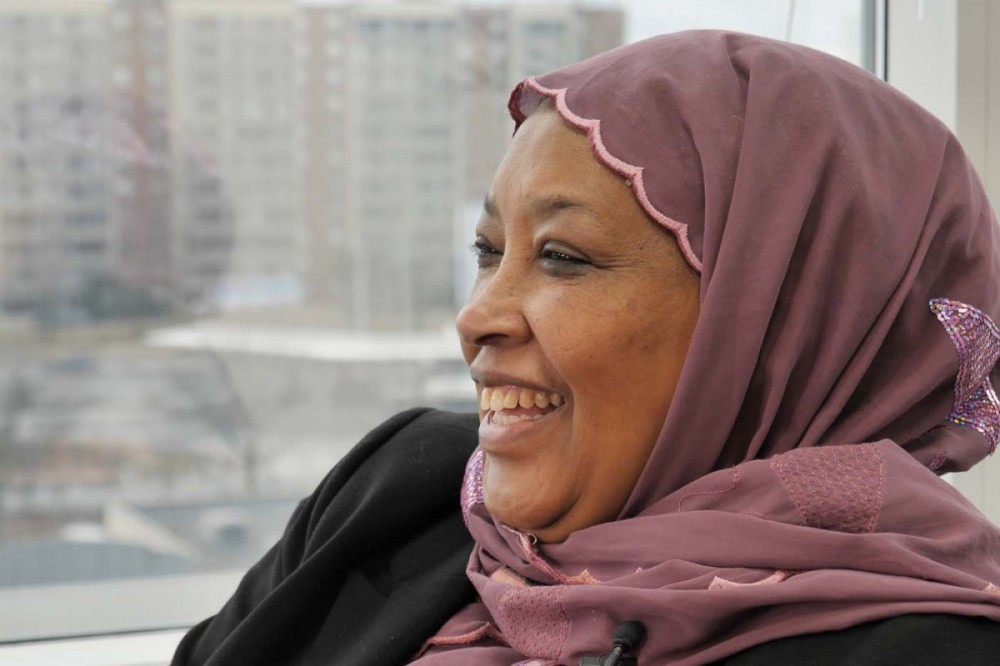
“We need to remember and remind everyone that workers’ rights were fought for and not given,” says Faduma Mohamed. PHOTOGRAPH: NADINE MACKINNON
Faduma Mohamed
Faduma Mohamed is executive director of Labour Community Services, a project of the Toronto & York Region Labour Council and the United Way. She works with labour and community groups addressing poverty in Toronto. In 2012, Mohamed co-founded Positive Change, a group created to address gun violence in Toronto’s Somali-Canadian community, and its systemic roots.
ON HOW SHE GOT INVOLVED: “Before I joined Labour Community Services, I was working as a frontline worker in Rexdale,” a Toronto neighbourhood. “Labour activists were approaching us during municipal and trustee elections. I later joined Labour Community Services and kept doing what I liked doing: community mobilizing, organizing for a positive change.”
ON THE BEST (AND WORST) PART OF WORK: “Being able to have a direct voice and platform to address issues on social justice — anti-racism, civil and human rights, etc. — and being able to take action with our partners in the community,” like United Way of Greater Toronto and the Toronto Community Benefits Network.
Mohamed is a realist about the pace of progress. “The worst part would be to acknowledge that change takes time and a lot of hard work; therefore, change doesn’t happen overnight.” Yet she takes heart from the shared struggle towards a better future. Specifically, she’s moved by those with whom she shares the struggle.
“Always people. How people stand up for their rights as well as for others, their unwavering perseverance to get their voices heard and take action. Workers of all ages, races and religions, coming together to tackle injustice never gets old, and when I see youth and young adults carry on this torch, it gives me hope.”
ON HISTORIC LABOUR MOMENTS: Mohamed names her highlights using the labour council’s 150th anniversary website. “'The Journey: 150 Years of Working Together for Justice' is an overview of how we started and where we came from, which is a foundational piece to where we are today and where we want to see ourselves in the future. 'The History of United Way and Labour' emphasizes labour and our communities’ shared mandate and commitment to working together to ensure no one falls through the cracks. 'The Toronto Joint Labour Committee for Human Rights' provides inspiration to continuously move forward boldly in the fight for equality and human rights — to make an impact not just for those within the labour movement, but for all people in Canada who were discriminated against, changing history for the better.”
May 26, 2021, was a special moment for the labour council. Mohamed says, “This year we celebrated the 16th annual Bromley Lloyd Armstrong Gala and Awards [virtually, for the first time], inspired by those who fought for inclusion, equity and human rights. We’ve recognized individuals who exceptionally made a difference within labour and their communities, and who continue to do so. For the first time, we also presented the award to a union — SEIU Healthcare, representing healthcare workers in Ontario.
"So, to be able to be inspired by and carry on the legacy of Bromley Lloyd Armstrong, today, and see people carry on his spirit in their own work is very meaningful.” (Former labour council president John Cartwright also received a Recognition of Service award at the virtual event.)
Although Canadian civil and labour rights pioneer Armstrong passed away in 2018, the Toronto & York Region Labour Council’s awards named in his honour connect his example to the present day and beyond. “Looking into our history is not difficult,” says Mohamed. “You also don’t need to go too far to know what still needs to be fixed. The best guide is to want to take a look at the information that’s already out there and try to fill in the gaps, and be vigilant about making sure the bad parts of our history don’t get repeated into the future.”
ON THE FUTURE: The Canadian workforce is in flux, but Mohamed says the principles of the labour movement are more relevant than ever. “Regardless of 1.5 years, 15, or 50 years, our economy will always need workers. What may differ is how we work and what jobs are available — this is normal and naturally happens over time with progress and new technology or, as many of us have experienced, working remotely due to the COVID-19 pandemic.
"We need to remember and remind everyone that workers’ rights were fought for and not given — so as long as we all remember to speak up and hold those in power accountable to providing good, stable jobs, then workers’ rights will continue to be relevant today and for the future.”
She raises an important question about how the loss of full-time jobs affects workers’ participation in unions: “The biggest challenge for longevity is always having someone who is willing to carry the torch, and what narratives are going to survive. With the majority of people having experienced working remotely during the pandemic, the gig economy and precarious work, it has changed the structure in which people work together. So, with the issue of workers’ rights, the main issue may be making decisions that are based on the longevity of a position and the overall collective.”
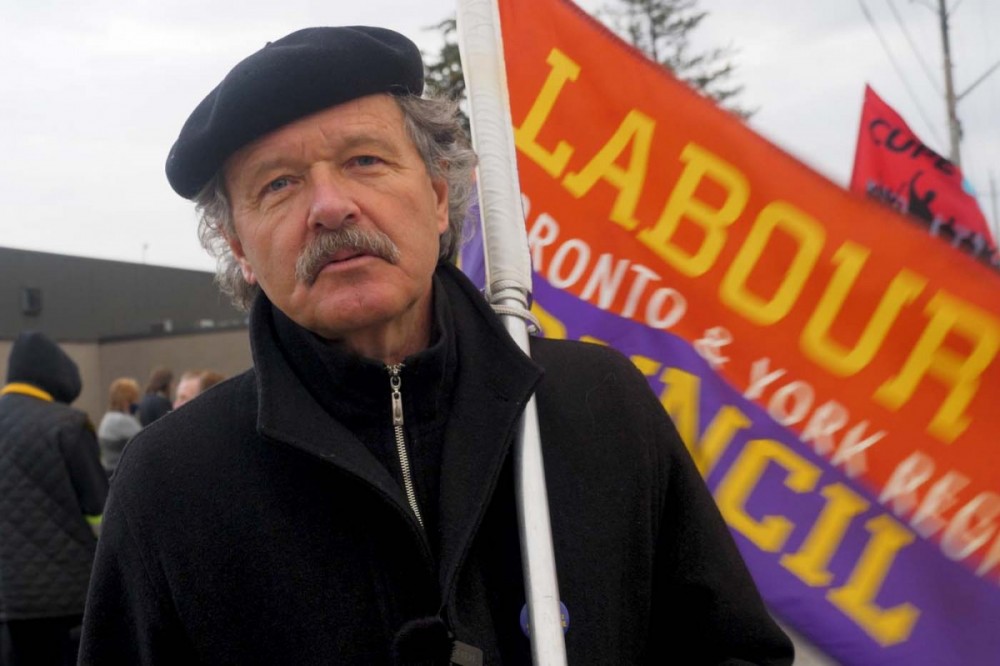
“Global solidarity is part of our DNA in this country and across the movement,” says John Cartwright. PHOTOGRAPH: NADINE MACKINNON
John Cartwright
John Cartwright, Toronto & York Region Labour Council president for the last 19 and a half years, welcomed new president Andria Babbington to the position on June 4 this year. He is national chair of the Council of Canadians, vice-chair of United Way of Greater Toronto, and co-chair of the Toronto Community Benefits Network.
ON THE PRESENCE OF THE PAST: A carpenter by trade, it was through his own career that Cartwright became acutely aware of how prevalent unsafe working conditions were and what health and safety mean to workers.
“For years and years and years, we went to work and did stuff that was horrifically harmful to us, making furniture with Formica veneers and all those other things. I’m a cancer survivor because the crap that I worked with for 10 years was full of toluene and benzene. It’s the same with all kinds of work that we were doing, whether it was in the mines or in construction.
“Even though people started realizing that stuff was incredibly harmful, it wasn’t until working people started shutting down workplaces and forcing politicians to respond — and having known champions who were elected to public office — that we actually got regulations and laws. It never came from charity.”
ON HISTORIC LABOUR MOMENTS: The labour movement can look to its own history for effective strategies against corporate greed. “You know, dockers around the world shut down ports in order to support striking workers from another country, in order to oppose apartheid or shipments of arms to military dictatorships,” Cartwright explains.
“That global solidarity is part of our DNA in this country and across the movement, and it will become even more important in future as global corporations become a bigger and bigger feature of the economy.”
Looking to moments in the labour council’s history, Cartwright says, “For me the most meaningful one is the work of the Toronto Joint Labour Committee on Human Rights, because that started in 1947 — that’s almost half of our history that we have had racial justice as a core aspect of labour’s work in the city. It hasn’t been every single union involved, and many people will look to areas where this issue is not resolved at all.
"But the fact that, as a collective, we named and identified the struggle against racial discrimination 74 years ago and created an organization to challenge that; the fact that we went out to restaurants and hotels and apartments, and Bromley Armstrong and Ruth Lor went down to Dresden, Ontario, as an intentional way of challenging racism, and helped to win the first human rights legislation in North America — that speaks to the best of our movement.”
ON THE FUTURE: “I think we are going to be severely tested when we come out of the COVID crisis. There will be a huge battle of ideas, of ‘what direction do we, as a society, move in?’ And there will be big sections of capital and the political elite demanding austerity, saying, you know, ‘look at this debt, it’s unbelievable, we have to dramatically cut our losses.’ And therefore there will be a push for privatization, austerity, selling off public assets . . . Essentially what Stephen Harper tried to build with the G20.”
But the economic comeback from COVID-19 could also prove a perfect moment to create a better future for workers, says the outgoing labour council president. “The pandemic has laid bare all of the inequalities, racial and income inequalities that were being hidden before, and we demand a much more just society. To some degree, that will be about financial policy, but it will also play out in the rights of workers.
“There’s an old guy with a beard who said the working class must be a class in itself and for itself,” he advises, referencing Karl Marx, not a philanthropic Santa Claus bearing patronizing ‘gifts’ for employees. “It has to recognize that it is a class, and nowadays, that’s not just ‘I’m a carpenter’ or the construction guys or the blue-collar people. It’s everybody who goes to work for wages or on a contract for somebody else. It’s 80 or 85 per cent of Canadians. And then it’s about determining that you want to have an agenda that is a conscious agenda of your own.”
For him, “the main issue going forward is whether we can regulate corporate behaviour effectively.”
Cartwright draws comparisons across history and geography, illustrating how today’s multinational corporations continue oppressive colonial traditions that separate workers from the fruits of their labour. People who were enslaved “as a form of labour goes back to the years of the first trade unions and the Tolpuddle Martyrs from the UK, who were banished for daring to ask for a trade union. It goes back to the anti-colonial struggles. It was the British East India Company that conquered much of India and took billions of dollars of wealth; it wasn’t the British government. It was King Leopold’s private company that went to Congo and took billions out of that place.
"So, the anti-colonial struggles were always about restricting corporate and business behaviour, and saying that your model cannot be more important than human rights.” He points out that the Universal Declaration of Human Rights, adopted by the United Nations General Assembly in 1948, “includes the rights of workers to have a collective voice, decent wages, dignity at work, and communities that are prospering.”
Melissa Keith is a former radio broadcaster and an award-winning freelance journalist. She lives in Lower Sackville, Nova Scotia.
For more information about the Toronto & York Region Labour Council's history and its ongoing anniversary celebrations, visit the labour council's commemorative website: labour150.ca.



